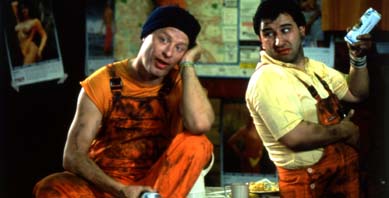"What You Looking At?" The Comedy of Immigration: The Foreigner as Laughing Stock and Walking Cliché
Parallel to the attempts made by ambitious film makers in the 1970s and 1980s to draw attention, via social dramas and documentaries, to the plight of foreign workers in Germany, a cliché of the foreigner as clown was developing in other areas of the cinema. This began in the 1970s with films like "Laß jucken, Kumpel" or "Geh zieh dein Dirndl aus," sex farces starring Italian actor Rinaldo Talamonti, who plays characters named "Roberto Ravioli" or "Vittorio Parmesano" and repeatedly gets into mischief with large, buxom blondes to the amusement of viewers. It has continued in more recent films as well: "Das merkwürdige Verhalten geschlechtsreifer Großstädter zur Paarungszeit" ("Love Scenes From Planet Earth", 1998), for instance, which has the German actor Dieter Landuris in the role of a puckish Italian who speaks a titillatingly broken German and is so stereotypically Mediterranean in his hot-headedness that, out of heartbreak, he decides to jump off the roof of a house. While the male lead in Doris Dörrie's entirely well-meaning comedy "Keiner liebt mich" ("Nobody Loves Me", 1994) is African, the character he plays is absurdly exaggerated, a mystic and "life artist" who paints his face with apparently archaic symbols, plays African drums, and possesses clairvoyant powers like a shaman. In her comedy-thriller "Happy Birthday, Türke" ("Happy Birthday!", 1992), on the other hand, Dörrie succeeds with a number of gags in which clichés of and prejudices toward Turks and other non-Germans are scoffingly played out ad absurdum.

Humor and Immigration: Strange Bedfellows Even Now
All in all there are surprisingly few films that deal with the issue of immigration through comedy. Rolf Lyssy's satire "Die Schweizermacher" ("The Swissmakers", 1978), which takes potshots at the Swiss naturalization process, was the first attempt at a comedic approach to the grotesque circumstances under which foreigners are "accepted" by an affluent Central European society. Another film from Switzerland is Bernard Safarik's "Hunderennen" ("Dog-Race", 1983), which nonchalantly, albeit with tragicomic vitriol, depicts the fate of East Europeans, former critics of the system, who end up selling out to consumption-oriented Western Europe. In Germany, "Ich Chef, Du Turnschuh" ("Me Boss, You Sneakers!", 1998) was one of the first productions that dared take a satirical look at the problems of immigration and asylum. The film tells the story of a newly arrived Armenian who leaves no stone unturned in his quest to get a residency permit. "Ich Chef, Du Turnschuh", however, was not as successful as the Swiss or Austrian comedies on the same subject. Apparently the "immigrant problem" in Germany is still considered too serious an issue to make jokes about. Nonetheless, some comedies have managed, in passing as it were, to ironically undermine clichés and stereotypes. The performances of non-German characters by Moritz Bleibtreu in "Knockin' on Heaven's Door" (1997), Erkan Maria Moosleitner in "Erkan & Stefan" (2000), and Hilmi Sözer in "Voll Normaaal" (1994) do not so much revisit racist stereotypes as reflect on obsolete clichés. Their figures are consciously deployed as hopelessly exaggerated not only to produce the obvious comic effects, but as an occasion for playing with wholly incidental prejudices and clichés ad absurdum. As simple as these films and their humor may seem, they subtly but surely hit their mark; for the only place where the image of the kooky foreigner with frightful German, bumbling through the world like a simple Simon, still obtains today, is in jokes.